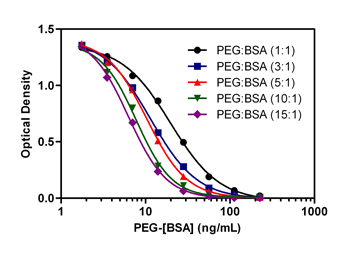- Validated for a wide range of MW linear and branched PEGs, both in free form and when conjugated to proteins
- Highly sensitive, measure as low as <1ng/mL of PEGylated proteins
- Quantify PEGylated target molecules in complex matrices to monitor drug levels or its accumulation in tissue
- High-throughput format, analyze up to 35 samples in duplicate results in just 2 hours
The PEGylated Protein ELISA kit is a competitive assay specific to the backbone of poly(ethylene glycol) (PEG) and has been validated for use with a wide variety of PEG molecules including linear and branched forms as well as free and conjugated forms. As expected, the assay is more sensitive to higher molecular weight PEG molecules due to the repeating characteristics of the backbone. The assay uses a monoclonal antibody to PEG pre-coated on a microtiter plate. The antibody binds in a competitive manner the PEG or PEGylated protein in the sample or the PEG covalently linked to biotin. After incubation at room temperature the excess reagents are washed away and a streptavidin HRP conjugate is added to bind to the biotinylated PEG bound to the antibody. After a second wash to remove excess HRP substrate is added. An HRP-catalyzed reaction gener-ates a blue color in the solution. The reaction is stopped with stop solution and the resulting yellow color is read at 450nm. The amount of signal is inversely proportional to the concentration of PEG.
Please mouse over
Product Details
| Alternative Name: | Polyethylene glycol |
| |
| Sensitivity: | <1 ng/ml (range 1.75-225 ng/ml) |
| |
| Assay Time: | 2 hours |
| |
| Applications: | ELISA, Colorimetric detection
|
| |
| Application Notes: | For the measurement of PEGylation and quantitative determination of PEGylated molecules in plasma, serum, tissue and other biological samples. |
| |
| Wavelength: | 450 nm |
| |
| Species reactivity: | Species independent
|
| |
| Shipping: | Blue Ice Not Frozen |
| |
| Long Term Storage: | +4°C |
| |
| Contents: | Microtiter Plate, PEG-BSA Assay Control, Biotinylated PEG, Assay Buffer 39, Conjugate, Wash Buffer 3, TMB Substrate, Stop Solution 2, Plate Sealer |
| |
| Scientific Background: | Poly(ethylene glycol) (PEG) is a widely used polymer in drug delivery systems and is often directly conjugated to a drug therapeutic. PEGylation of drug therapeutics is desirable as it has been found to increase the retention time, reduce the immunogenicity and increase stability towards metabolic enzymes. The PEGylated Protein ELISA kit is applicable for drug development and pharmaceutical manufacturing applications including drug formulations, pharmacokinetics analysis, drug comparison, lead candidate identification, lot release criteria and in-process QC studies. At this time, there are no long-term studies revealing the fate of this polymer in the body. The need for toxicology studies that would determine the accumulation of the metabolized PEGylated therapeutics in various tissues has been identified. |
| |
| Technical Info/Product Notes: | Application Note: An ELISA Kit for the measurement of PEGylation and quantification of PEG and PEGylated molecules |
| |
| Regulatory Status: | RUO - Research Use Only |
| |
| Compatibility: | This product is compatible with the Absorbance 96 Plate Reader.
 |
| |
Product Literature References
Lipoid Pneumonia Associated with Polyethylene Glycol Chronic Aspiration: P. Brancaleone, et al.; Am. J. Respir. Crit. Care Med.
207, e71 (2023),
Abstract;
COVID-19 mRNA vaccination in lactation: assessment of adverse events and vaccine related antibodies in mother-infant dyads: Y. Golan, et al.; Front. Immunol.
12, 777103 (2021),
Application(s): ELISA using human milk,
Abstract;
Full Text
Targeting Pancreatic Cancer Cells and Stellate Cells Using Designer Nanotherapeutics in vitro: C.K. Elechalawar, et al.; Int. J. Nanomedicine
15, 1003 (2021),
Abstract;
Full Text
Carrier-enhanced anticancer efficacy of sunitinib-loaded green tea-based micellar nanocomplex beyond tumor-targeted delivery: N. Yongvongsoontorn, et al.; ACS Nano
13, 7591 (2019),
Abstract;
Development and validation of analytical methodologies for the quantification of PCK3145 and PEG-PCK3145 in mice: C. Danika, et al.; Anal. Biochem.
564, 72 (2019),
Application(s): Quantification of PEGylated peptides,
Abstract;
Preclinical evaluation of topically-administered PEGylated Fab'lung toxicity: D. Freches, et al.; Int. J. Pharm. X
1, 100019 (2019),
Application(s): ELISA using alveolar macrophages,
Abstract;
Full Text
A Tumor Vascular‐Targeted Interlocking Trimodal Nanosystem That Induces and Exploits Hypoxia: X. Luan, et al.; Adv. Sci. (Weinh.)
5, 1800034 (2018),
Application(s): QC of nanosystem for drug delivery,
Abstract;
Full Text
Bone-targeting dendrimer for the delivery of methotrexate and treatment of bone metastasis: S. Yamashita, et al.; J. Drug Target
26, 818 (2018),
Abstract;
Development of PEGylated carboxylic acid-modified polyamidoamine dendrimers as bone-targeting carriers for the treatment of bone diseases: S. Yamashita, et al.; J. Control. Release
262, 10 (2017),
Abstract;
Prolonged immunomodulation in inflammatory arthritis using the selective Kv1.3 channel blocker HsTX1[R14A] and its PEGylated analog: M.R. Tanner, et al.; Clin. Immunol.
180, 45 (2017),
Application(s): PEGylated peptides in rat serum,
Abstract;
Preferential uptake of antioxidant carbon nanoparticles by T lymphocytes for immunomodulation: R. Huq, et al.; Sci. Rep.
6, 33808 (2016),
Application(s): PEGylated hydrophilic carbon clusters in serum,
Abstract;
Full Text
PEGylation of magnetic poly(glycidyl methacrylate) microparticles for microfluidic bioassays: J. Kucerova, et al.; Mater. Sci. Eng. C Mater. Biol. Appl.
40, 308 (2014),
Abstract;
PEGylation of Biologics: Kling, J.; BioProcess International
11, 35 (2013),
Full Text
General Literature References
Poly(ethylene glycol) in drug delivery: pros and cons as well as potential alternatives: K. Knop, et al.; Angew. Chem. Int. Ed. Engl.
49, 6288 (2010),
Abstract;
Related Products


















